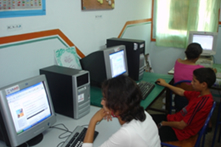Democracy and Governance

In Morocco, USAID has pioneered online debates on democracy issues. Organized by USAID’s Parliamentary Support Project, two online discussion forums focused on anticorruption and local democracy and attracted nearly 3,000 participants. (Photo: Karima Rhanem)
MIDDLE EAST DEMOCRACY & GOVERNANCE PROGRAMS
Egypt, Iraq, Jordan, Lebanon, Morocco, West Bank/Gaza and Yemen
CONTACTS
Ricki Gold
Program Analyst
Tel: (202) 712-4922
Email: rgold@usaid.gov
Overview
Countries in the Middle East and North Africa range from those in the early stages of nation building to formal democracies. Challenges include corruption, weak democratic institutions and poor governance. In some cases, extremism threatens regional stability. USAID programming in democracy and governance bolsters democratic institutions, mitigates the appeal of extremism, helps combat corruption and contributes to long-term development.
Programs
Building Democratic, Accountable and Effective Government
Across the Middle East and North Africa, there is a need to make governments more representative, accountable and effective. USAID addresses these issues by strengthening government transparency, increasing executive branch capacity, enhancing legislative institutions and improving local governance. In Lebanon and Iraq, USAID works with local governments to develop their ability to deliver critical basic services. In Jordan and Morocco, USAID strengthens the parliament through orientation programs, training, technical assistance and commodities.
Promoting the Rule of Law and Justice
In most countries in the region, there is a need to improve judicial institutions and due process. USAID programs advance the rule of law by supporting constitutional and legal reform, promoting human rights and judicial independence, and improving administration of justice. Programs assist the efforts of governments that demonstrate a commitment to judicial reform as well as the efforts of nongovernmental groups to increase the demand for legal and judicial reform. In Egypt, a USAID program resulted in the swearing in of 30 women judges—previously, there was only one. In Egypt and Jordan, USAID projects also support improvements in criminal courts, legal education and access to justice for women and disadvantaged groups.
Expanding Political Competition
Citizens and groups across the region are seeking to actively and openly participate in decision making that affects their lives. Restrictions on the formation of democratic political parties and civil society organizations contribute to poor policymaking and lack of accountability. USAID programs help expand political competition by supporting democratic political parties, transparent electoral administration, and independent media and civil society. In Morocco, USAID supports projects to develop partnerships between citizens and governments to deliver tangible community results. In Lebanon, USAID funds civil society organizations that speak out in favor of transparency, accountability and good governance.
Back to Top ^
|


